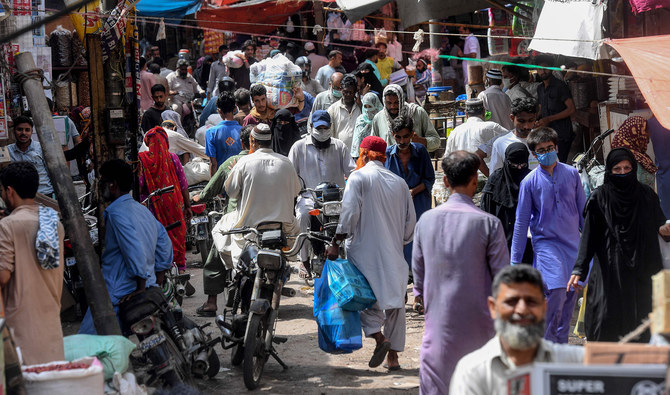ISLAMABAD: Pakistan must take long-term and wide-ranging measures to ensure the revival of its industrial and services sectors, senior economists said after the launch of Pakistan Economic Survey 2019-20 on Thursday, recommending the government to keep the economic targets realistic for the upcoming fiscal year.
The country’s Gross Domestic Product (GDP) growth for the fiscal year 2020 is estimated at negative 0.38 percent due to the negative 2.64 percent and negative 0.59 percent growth in the industrial and services sectors, respectively.
“The clock has turned back. This government started the fiscal year with higher deficit and lower growth and it was ending with the same trend,” Khurram Husain, an economist and business editor at daily Dawn, told Arab News.
He said that much of the negative economic impact on different sectors during the outgoing fiscal year was due to the COVID-19 outbreak, but “still the government should have performed better.”
Husain said the government had initiated macroeconomic adjustments under the International Monetary Fund’s (IMF) $6 billion bailout package, and it would have to take “tough measures” in the upcoming year as well to ensure social protection for the poor and job opportunities for the bulging youth.
Pakistan signed the bailout package with the IMF in May last year to stave off a looming balance of payments crisis. The country had initiated tough economic reforms in the public sector under the program which experts believe resulted in the devaluation of rupee against dollar and high interest rates.
“The good thing, at the moment, is that inflation rate and energy prices are low as compared to the previous months,” Husain said, urging the government to adopt a holistic approach to revive the economy.
Economists said the survey document was a reflection of the “ground realities” and the government should take guidance from it to prepare the budget for the upcoming financial year.
“This was a challenging year. The economy was already in a downturn because of the type of policies we pursued to correct our balance of payments,” Dr. Ashfaque Hasan Khan, senior economist and Principal and Dean of the School of Social Sciences and Humanities at NUST, told Arab News.
He said the economy had contracted, the per capita income had declined and COVID-19 had severely dampened the domestic and global economic activities. “This is the time to provide relief to businesses and people to revive the economy and not to indulge in setting unrealistic revenue targets,” Khan said.
Dr. Vaqar Ahmed, who works as the deputy executive director at the Sustainable Development Policy Institute in Islamabad, said the government had managed to gain “some public sympathy and favor” due to the impact of COVID-19 on the country’s economy in the last two quarters of the financial year.
However, he added: “It has clearly failed to come up with viable structural reforms targets agreed with the IMF like circular debt plan, privatization of public entities and overcoming losses in public sector enterprises.”
Ahmed suggested the government to present a clear-cut policy on tax targets, power sector subsidies for consumers and provincial revenue surpluses in the upcoming budget to revive the economy
“The economic revival remains the real challenge for the government, and this can only be achieved through transparency in each sector and good governance,” he added.
Wide-ranging measures required to boost Pakistan’s economy — experts
https://arab.news/jdjj7
Wide-ranging measures required to boost Pakistan’s economy — experts

- Economists ask the government to set realistic revenue targets to revive the economy
- Say the government had failed to achieve structural reform targets that were agreed with the IMF
Pakistan’s Agha weighs future after poor T20 World Cup campaign

- Pakistan suffered defeats at hands of heavyeights England, arch-rivals India in the tournament
- Pakistan’s middle order often did not click while spinners could not exploit turning conditions
Sri Lanka’s Sanath Jayasuriya said he will step down as head coach, while Pakistan’s Salman Agha said he will take time to decide whether to remain captain after both teams’ poor campaigns at the Twenty20 World Cup.
Tournament co-hosts Sri Lanka made the Super Eights but the 2014 champion lost all three matches to finish at the bottom of Group Two.
“I thought it was time to give it (the job) to someone else,” Jayasuriya said after their narrow defeat to Pakistan on Saturday.
“That’s why about two months ago I’d said during the England series that I don’t have hopes of staying in the job for long. I’d taken this decision by then.
“I thought I’d be able to leave as coach on a good note in the World Cup. I wasn’t able to do that as well as I’d like, and I’m sad about that.”
The former captain, whose contract runs until June, said he was yet to convey his decision to Sri Lanka Cricket.
“I haven’t given SLC any news officially yet. They don’t know that I am going to say this even. I will need to go and discuss with them.”
It was an underwhelming tournament for Pakistan as well that included a comprehensive defeat at the hands of arch-rivals India in a group match.
Pakistan’s middle order often did not click, while their slow bowlers could not make the most of the spin-friendly conditions in Sri Lanka where they played all their matches.
“We have underperformed in the whole tournament,” captain Agha told reporters.
“We are out of the semis due to our failure in decision-making in pressure situations.”
Agha said he and head coach Mike Hesson took full responsibility for their poor performance in a global multi-team event.
He was unhappy with his own form but said he was not in a hurry to take a call on whether to stay as Pakistan’s white-ball captain.
“I will go back and take some time to decide,” the 32-year-old said.
“Because at this point of time stepping down would be an emotional decision.”










